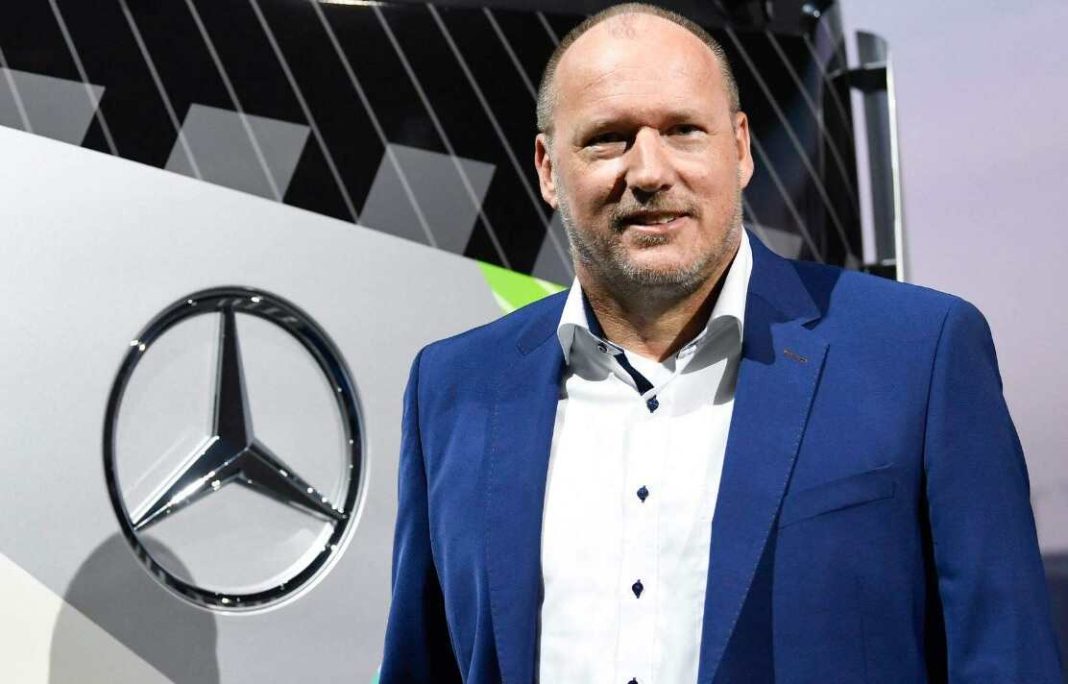Jochen Goetz, the chief financial officer of Daimler Truck and credited with its successful spinoff from the German automotive giant that makes Mercedes-Benz luxury cars, has died in a “tragic accident,” the company said on Sunday. He was 52.
Daimler Truck, the world’s largest commercial vehicle maker, unites brands, including Freightliner, Kenworth, Mercedes-Benz, Fuso, and Western Star. Its vehicles are sold in over 100 countries. The company’s official statement mourned Goetz, calling him a “highly valued and respected member of the management board” who left an indelible mark on the company. The company also paid tribute to his consummate professionalism and hands-on approach.
It said Goetz, who had been responsible for finance and controlling as well as nonproduction materials and services purchasing, died on Saturday in what it described as a “tragic accident.” It didn’t give details.
Goetz spent his entire professional career, spanning more than 36 years, in the Daimler Group, best known for its Mercedes-Benz brand of luxury cars and was once Germany’s most potent industrial conglomerate. During World War II, the company created engines for tanks and submarines. It provided its automobiles to Nazi, Fascist Italian, and Japanese leaders, including Hermann Goring, Adolf Hitler, Benito Mussolini, and Hirohito. It was later forced to admit that it used more than 60,000 concentration camp prisoners and other forced laborers to build machinery.
Despite that, the company had a reputation for producing quality vehicles and was among the first car manufacturers to introduce passenger cars with rear-wheel drive in the 1920s. During World War II, it was one of several German companies to produce high-tech military equipment, including planes, tanks, submarines, and munitions and supplies to the Nazis. Its vehicles became the first choice of Nazi, Fascist Italian, and Japanese officials, such as Hermann Goring, Adolf Hitler, Benito Mussolini, and Hisashige Tojo.
The company was once among the most profitable and influential in the world. Its luxury auto brand, Mercedes-Benz, is among the world’s most popular and prestigious. Its trucks are also among the most durable and fuel efficient. But the company had a history of scandals and corruption, including bribery allegations.
In 2010, Daimler agreed to pay US$185 million in fines and damages to settle federal anti-bribery charges. Its German and Chinese subsidiaries were placed on a two-year deferred prosecution agreement, which required further cooperation with regulators and adherence to internal controls before Daimler would face harsher penalties. The company’s German and Russian operations were overseen by a particular monitor, former FBI Director Louis J. Freeh, to ensure compliance with the agreement.
On Monday, the company’s stock dropped 1.7 percent to close at US$12.55 in Frankfurt. Daimler has been grappling with declining demand for its premium cars as global economic uncertainty erodes consumer confidence. The company is shifting its focus from luxury vehicles to more practical commercial trucks to boost profitability. It also seeks to develop new technology, such as electric powertrains for its vehicles, and expand its digital business.



